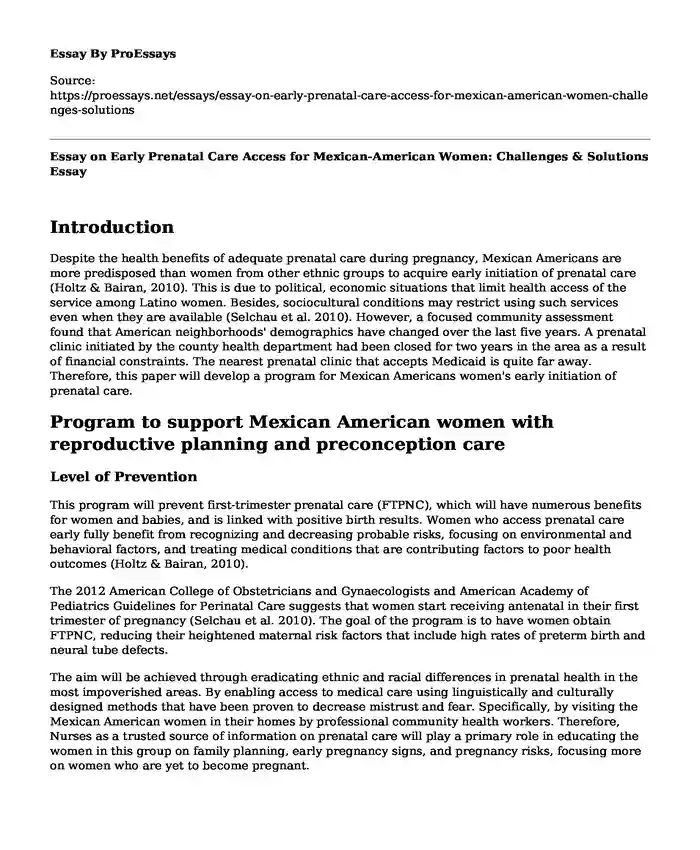Introduction
Despite the health benefits of adequate prenatal care during pregnancy, Mexican Americans are more predisposed than women from other ethnic groups to acquire early initiation of prenatal care (Holtz & Bairan, 2010). This is due to political, economic situations that limit health access of the service among Latino women. Besides, sociocultural conditions may restrict using such services even when they are available (Selchau et al. 2010). However, a focused community assessment found that American neighborhoods' demographics have changed over the last five years. A prenatal clinic initiated by the county health department had been closed for two years in the area as a result of financial constraints. The nearest prenatal clinic that accepts Medicaid is quite far away. Therefore, this paper will develop a program for Mexican Americans women's early initiation of prenatal care.
Program to support Mexican American women with reproductive planning and preconception care
Level of Prevention
This program will prevent first-trimester prenatal care (FTPNC), which will have numerous benefits for women and babies, and is linked with positive birth results. Women who access prenatal care early fully benefit from recognizing and decreasing probable risks, focusing on environmental and behavioral factors, and treating medical conditions that are contributing factors to poor health outcomes (Holtz & Bairan, 2010).
The 2012 American College of Obstetricians and Gynaecologists and American Academy of Pediatrics Guidelines for Perinatal Care suggests that women start receiving antenatal in their first trimester of pregnancy (Selchau et al. 2010). The goal of the program is to have women obtain FTPNC, reducing their heightened maternal risk factors that include high rates of preterm birth and neural tube defects.
The aim will be achieved through eradicating ethnic and racial differences in prenatal health in the most impoverished areas. By enabling access to medical care using linguistically and culturally designed methods that have been proven to decrease mistrust and fear. Specifically, by visiting the Mexican American women in their homes by professional community health workers. Therefore, Nurses as a trusted source of information on prenatal care will play a primary role in educating the women in this group on family planning, early pregnancy signs, and pregnancy risks, focusing more on women who are yet to become pregnant.
Target Population
The program target population is Latino women, especially those along the US-Mexican border. Despite federal attempts leading to increased FTPNC among the American public, ethnic minority and low-income women continue lagging behind the nation-wide rates (Selchau et al. 2010). Nationally and alongside the US-Mexico border, the number of Latino women accessing early prenatal care is low.
Cultural Issues
Cultural traditions and beliefs deter Mexico-American women from early prenatal care (Bleakney, 2010). For instance, Immigrant Latino women in the U.S. start PNC late into their pregnancy as a result of their experiences, beliefs, and traditions, which do not call for early prenatal care.
Other Issues Specific to the Population
Another issue facing Mexican-American women is the lack of insurance cover (Selchau et al. 2010). Most women do not have health insurance, and there are no hospitals to which accept Medicaid as the one funded by the county health department was closed two years ago. Further, late pregnancy recognition is prevalent among this group of women. As such, the lack of health insurance and late pregnancy recognition are some of the issues affecting this population (Selchau et al. 2010). Another issue is the lack of accurate knowledge among Mexican American women about PNC was linked to higher FTPNC (Holtz & Bairan, 2010). Thus, the above issues, together with a lack of inclusive insurance policies by the county governments, this program to connect women to low-cost health services, is still more vital.
Conclusion
In conclusion, trained community health workers visiting Mexican American women in their homes will ensure that they receive early prenatal care. This is through educating them on the risk of pregnancy, benefits of early prenatal care, and family planning. Thus, the nurses will be able to fight against late prenatal care in the area. Furthermore, it will be easier for the women in this group to access the medical health system. Therefore, implementing this program will ensure that Latino mothers' maternal health will improve along with the health of their babies.
References
Bleakney, C. A. (2010). Prenatal care of Hispanic mothers.
Holtz, C., & Bairan, A. (2010). Barriers and facilitators to prenatal care for pregnant Latina women in Cobb County, Georgia. Journal of Global Initiatives: Policy, Pedagogy, Perspective, 1(2), 2.
Selchau, K., Babuca, M., Bower, K., Castro, Y., Coakley, E., Flores, A., ... & Samuels, D. (2017). First trimester prenatal care initiation among Hispanic women along the US-Mexico border. Maternal and Child Health Journal, 21(1), 11-18.
Cite this page
Essay on Early Prenatal Care Access for Mexican-American Women: Challenges & Solutions. (2023, May 03). Retrieved from https://proessays.net/essays/essay-on-early-prenatal-care-access-for-mexican-american-women-challenges-solutions
If you are the original author of this essay and no longer wish to have it published on the ProEssays website, please click below to request its removal:
- Nursing Informatics Administrative Applications
- Changing Indian Diets Paper Example
- Essay Example on Afraid to Die: HIV/AIDS Reality in South Carolina
- LGBTQ Youth: At Risk of Discrimination and Suicide - Research Paper
- Essay Example on Genetic Diseases: Single Gene Inheritance & Its Types
- Paper Example on East African Locust Crisis: A Growing Plague
- Movie Review Example on Camp Crip: A Revolution for People with Disabilities







